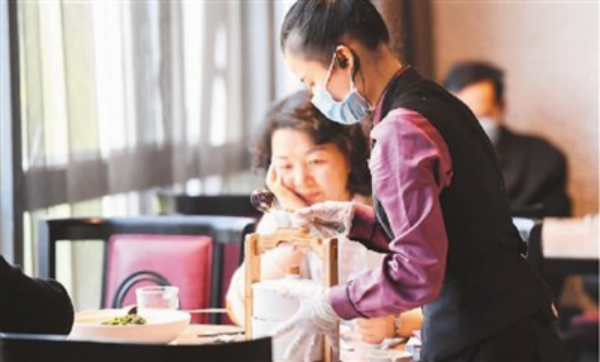

Professionals in the Chinese catering industry have been using contactless solutions to reduce risks of infection while retaining their customers amid the COVID-19 epidemic.

A waitress provides a serving spoon to customers at a restaurant in Yuelu district, Changsha, capital of central China’s Hunan province, on April 15. (Photo by Chen Zeguo/Xinhua)
The first group of restaurants recommended by the China Hospitality Association and brands in the sector recently started to offer contactless services in their dining areas, where customers order food on their mobile phones and then collect their own meals.
This kind of contactless practice is being seen in other scenarios, such as supplies of fresh food and delivery of ready-to-serve food.
Kuailv Jinhuo, the business-to-business arm of China’s largest on-demand service platform Meituan, delivers fresh food to restaurants, helping them ensure hygiene and safety on the supply side.
Workers at Kuailv’s warehouses are required to have their body temperatures taken once or twice per day and change face masks every four hours. In addition, all its warehouses and delivery vehicles are thoroughly disinfected every day, and drivers are required to wear masks during the entire delivery process.
“We also offer contactless delivery services, with drivers calling restaurants to collect orders at pre-determined locations and taking photos to indicate that orders have been delivered after they are confirmed,” said Yang Xiaoguang, head of Kuailv’s logistics department, adding that the measures mean the need for direct human contact is avoided and reduce the risk of infection.
With local governments in China encouraging contactless food ordering services, Meituan launched its new human contact-free app feature to encourage restaurants to put their QR codes outside their dining areas. This way, customers can order food by scanning QR codes and then collecting their own meals.
Top Chinese catering companies are also deploying robots to deliver food to their customers. In a branch of the Dolar Shop Hot Pot Restaurant in Shanghai, a robot named Peanut takes food to customers.
The robot can deliver 300 dishes per day and 450 during peak hours, said Chi Xiaoming, chief public relations officer of its developer Keenon Robotics.
In addition, smart food cabinets are also contributing to the contactless food delivery movement. Meituan’s main rival in the food delivery sector, Eleme, has launched smart food cabinets in major office buildings in Shanghai. The dining cabinets are equipped with automatic disinfection and heat preservation functions to ensure diners’ safety. Reports confirm that the platform plans to deploy another 1,000 cabinets in the city, and launch more in about 20 other Chinese cities.
 Fire brigade in Shanghai holds group wedding
Fire brigade in Shanghai holds group wedding Tourists enjoy ice sculptures in Datan Town, north China
Tourists enjoy ice sculptures in Datan Town, north China Sunset scenery of Dayan Pagoda in Xi'an
Sunset scenery of Dayan Pagoda in Xi'an Tourists have fun at scenic spot in Nanlong Town, NW China
Tourists have fun at scenic spot in Nanlong Town, NW China Harbin attracts tourists by making best use of ice in winter
Harbin attracts tourists by making best use of ice in winter In pics: FIS Alpine Ski Women's World Cup Slalom
In pics: FIS Alpine Ski Women's World Cup Slalom Black-necked cranes rest at reservoir in Lhunzhub County, Lhasa
Black-necked cranes rest at reservoir in Lhunzhub County, Lhasa China's FAST telescope will be available to foreign scientists in April
China's FAST telescope will be available to foreign scientists in April "She power" plays indispensable role in poverty alleviation
"She power" plays indispensable role in poverty alleviation Top 10 world news events of People's Daily in 2020
Top 10 world news events of People's Daily in 2020 Top 10 China news events of People's Daily in 2020
Top 10 China news events of People's Daily in 2020 Top 10 media buzzwords of 2020
Top 10 media buzzwords of 2020 Year-ender:10 major tourism stories of 2020
Year-ender:10 major tourism stories of 2020 No interference in Venezuelan issues
No interference in Venezuelan issues
 Biz prepares for trade spat
Biz prepares for trade spat
 Broadcasting Continent
Broadcasting Continent Australia wins Chinese CEOs as US loses
Australia wins Chinese CEOs as US loses